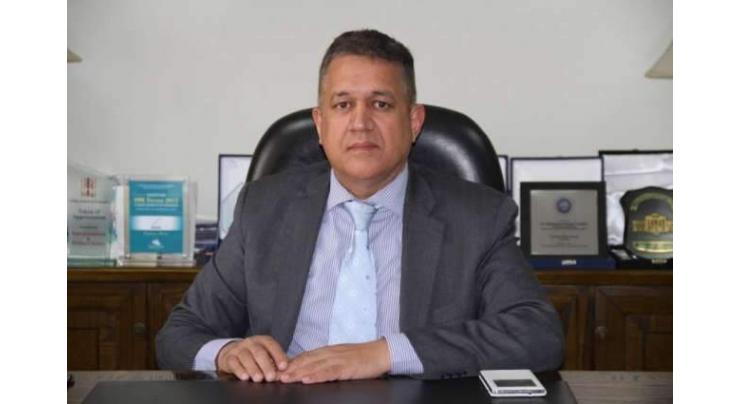
- Home
- Business
- News
- NPO vows to strengthen national capacity in productivity, for enhancing competitiveness
NPO Vows To Strengthen National Capacity In Productivity, For Enhancing Competitiveness
Muhammad Irfan Published August 20, 2020 | 07:36 PM

The Chief Executive Officer (CEO) of National Productivity Organization (NPO) Muhammad Alamgir Chaudhry on Thursday said that NPO wanted to strengthen the national capacity in productivity, quality and competitiveness for sustainable socio-economic development in the country
ISLAMABAD, (UrduPoint / Pakistan Point News - 20th Aug, 2020 ) :The Chief Executive Officer (CEO) of National Productivity Organization (NPO) Muhammad Alamgir Chaudhry on Thursday said that NPO wanted to strengthen the national capacity in productivity, quality and competitiveness for sustainable socio-economic development in the country.
The NPO have the vision and mission to formulate the local industrial sector as productive and competitive to compete in international market, he said this while addressing the press conference here at NPO office.
The CEO said the main objectives of NPO was Strategic Planning and Setting up NPO direction was optimum Utilization of APO Productivity Improvement Projects, Services and Human Capital Development.
"We want to introduce,' Digital Learning to Propagate Productivity' as an evolving the concept 'Green Productivity Initiatives' for industrial operations efficiency, environment development and planning, prevention of pollution and industrial wastage," he added.
He said that these were new Initiatives taken for Productivity Improvement, Productivity Promotion and Image Building of NPO.
While discussing the APO Support Programs , he said that Industrial Productivity , Green Productivity (GP),Energy Efficiency (EE) , Material Flow Cost Accounting (MFCA) , Human Capital Development , National and International Programs (trainings, workshops, seminars, conferences and study missions), International Technical Services to support industrial productivity are the main focus of his institution.
Discussing on future actions, he said that compliance to SECP requirements, optimum utilization of APO Projects, APO projects through competitive process, Salary rationalization, replacement of Office and Audit equipment and Furniture and Fixture Lost and Implementation of employees approved service Rules are also under consideration.
For enhanced the coverage ,he said that "We followed in-company Productivity Programs , Green Productivity Assessments ,Material Flow Cost Accounting (MFCA) , Energy Efficiency and Conservation , Distance Learning Programs , Developing Proposal on Productivity Movement , Institutional Capacity Building, Developing Productivity Master Plan Future Action Progress Made Sr. APO Projects Status 1. " He informed that Institutional Capacity Building of NPO Proposal submitted, APO principally agreed, to be initiated as soon Covid-19 situation ease out.
He said that development of National Productivity Master Plan of Pakistan Proposal submitted, APO principally agreed, would be initiated soon.
The CEO said the development of NPO to become a Certification Body for APO programs Proposal submitted to APO, Project Implementation Plan to be issued by APO shortly and establishment of a Center of Excellence on Digital Learning too.
Muhammad Alamgir said that for enhancing Productivity in Higher education" the Proposal submitted to APO in collaboration with HEC and VU 5." While briefing on the history of NPO, he said that Working as Liaison Office of APO, Japan 2001 Since Inception NPO remained with PITAC till 2001.
He said that NPO office established relocated to Islamabad under Expert Advisory Cell (EAC) 2006 NPO incorporated as Public Sector Company registered with SECP under section 42 of Companies Ordinance 1984, 1999 National Productivity Council (NPC) established.
Replying to question, he said that the APO had 20 member countries from Asia-Pacific, including Japan Bangladesh, Cambodia, Republic of China, Fiji, Hong Kong, India, Indonesia, Islamic Republic of Iran Japan, Republic of Korea, Lao PDR, Malaysia, Mongolia, Nepal, Pakistan, Philippines, Singapore, Sri Lanka, Thailand, Turkey and Vietnam.
Related Topics
Recent Stories

Bushra Ansari ties knot with Iqbal Hussain

Shaheen likely to miss initial two matches of Pak Vs NZ T20I series

LHC suspends PML-N Rana Arshad’s victory notification from PP-133

Faizabad Dharna Commission exonerates former Spy Chief Faiz Hameed

Pakistan calls for enhanced information integrity on digital platforms

Pakistan starts discussion with IMF about new loan agreement: Finance Minister

Currency Rate In Pakistan - Dollar, Euro, Pound, Riyal Rates On 16 April 2024

Today Gold Rate in Pakistan 16 April 2024

Govt hikes petrol price by Rs4.53 per litre for next fortnight

British Investment Group, One Homes, Expected to launch second development at Ce ..

Pakistan Army continues rescue operations in rain-affected areas

"China Ready to Strengthen Counter-Terrorism Cooperation with Pakistan: Envoy"
More Stories From Business
-
Germany's wholesale prices continue to drop in March
41 minutes ago -
Turkish stock exchange down at open
41 minutes ago -
Chinese economy expands by 5.3% in Q1
51 minutes ago -
Total turnover in Turkish economy up by 85.1% in February
51 minutes ago -
KPT shipping movements report
1 hour ago -
China's industrial output up 6.1 pct in Q1
2 hours ago
-
China's surveyed urban unemployment rate at 5.2 pct in Q1
2 hours ago -
China's fixed-asset investment up 4.5 pct in Q1
2 hours ago -
Foreign exchange rates
5 hours ago -
Exchange rates for currency notes
5 hours ago -

Currency Rate In Pakistan - Dollar, Euro, Pound, Riyal Rates On 16 April 2024
5 hours ago -

Today Gold Rate in Pakistan 16 April 2024
6 hours ago







